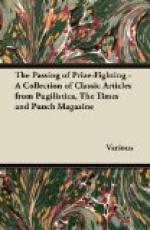Sir CHARLES WALDSTEIN, author of the thoughtful Aristodemocracy, is a thinker with an internationalist mind. But pray don’t think he’s not a whole-hogger about the War. In What Germany is Fighting For (LONGMANS) he analyses the Germans’ statement of their war-aims and does good service by presenting an excellent translation, with comment and epilogue, of the famous manifesto of “The Six Associations,” and the “Independent Committee for a German Peace.” It is an insolent, humourless, immoral document. Anything like it published in England would be laughed out of court by Englishmen. It is difficult to keep one’s temper when one reads all this nauseating stuff about the little German lamb being threatened by the wolf, England (or Russia or France, as best suits the current paragraph), and Germany’s fine solicitude for the freedom of the seas. It is no disrespect to Sir CHARLES WALDSTEIN that his acute and dispassionate comment is not so forcible an argument to hold us unflinchingly to the essence of our task as any page of the manifesto itself. The German, with all his craft, has an almost unlimited capacity for giving himself away. It would seem that, after all, humour is the best gift of the gods.... Our commentator ends with an epigram to the general effect that “until they adopt, in common with us, the ideal of the Gentleman, in contradistinction to that of the Superman,” we must continue to strafe them in war or peace. His book constitutes an important War document.
* * * * *
If I had been compelled to nominate an author to write a book called The Gossip Shop (HODDER AND STOUGHTON) I should have selected Mrs. J.E. BUCKROSE without a moment’s hesitation. So I ought to be happy. Anything more soothing to tired nerves than the tittle-tattle of these Wendlebury old ladies it is impossible to imagine. And to add to the lullaby we are given an ancient cab-horse called Griselda, who with a flick of her tail seems to render the atmosphere even more calm and serene. Then there is a love-story which, in spite of misunderstandings, is never really perturbing, and—as a spice—a fortune telling lady who in such respectable society is as near to being naughty as doesn’t matter. Small beer? Perhaps. But if you want to get away from the War and rumours of it, I advise you to take a draught of this tranquillizing potion.
* * * * *
[Illustration: OUR HISTORICAL MUSEUM.
FANCY PORTRAIT OF THE LAST BLOWER OF THE LAST WHISTLE
FOR A LONDON
CAB, AUGUST 21ST, 1917.]
* * * * *
From a Booksellers’ Catalogue:—
“PLUTARCH: His Life, his Parallel Lives, and his Morals. 3/6.”
So spicy a story is surely cheap at the price.
* * * * *
“The cause of the explosion
is unknown, but it is assumed that
some combustible matter was
among the coal.”—Daily Dispatch.




